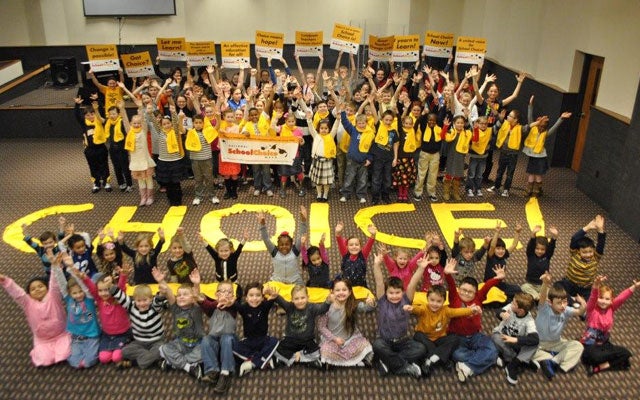Later today at their annual meeting in Washington, D.C., the American Federation of Teachers (AFT) will detail the results of a poll it commissioned.
According to The Washington Post, the AFT poll found that 56 percent of respondents were opposed to “giving tax dollars to families to pay for private school tuition,” while 41 percent approved. The AFT’s poll also appears to conflate parent sentiment against “closing low-performing schools and reassigning students to a different school” with opposition to school choice. Reassigning a child to a school is not the same as empowering parents to choose any school that best matches their child’s learning needs.
Other surveys on school choice—of which there are a growing number—tell a different story about public sentiment toward choice in education.
A PDK/Gallup poll released last summer found that, when asked nearly the same question—whether they supported allowing students to choose private schools at public expense—44 percent of Americans said yes. Gallup has asked respondents the same question for the past decade and found that support for school choice has jumped 10 percentage points in just the last year alone.
The Friedman Foundation for Educational Choice found that more than 66 percent of mothers of school-age children said they favored school vouchers for all students. The statistically representative national survey also found that 69 percent of respondents support tax credit scholarship options that provide scholarships to children to attend private schools of their choice. They also expressed more confidence in private schools than in traditional public schools.
The Friedman Foundation also conducted a series of informative state surveys. Two-thirds of Texas respondents favor school vouchers, and 72 percent support tuition tax credit scholarships. Moreover, 71 percent of black respondents and 80 percent of Hispanic residents polled in Texas favored vouchers to attend private schools of choice.
In Maine, 55 percent of residents support vouchers; in Tennessee, the number grows to 60 percent. In North Carolina, support is high for various school choice options: 56 percent of voters support education savings accounts, 65 percent support charter schools, and 65 percent support tax credit scholarships enabling children to attend private schools of choice.
Support for choice in Virginia is evident among diverse groups of voters. The Friedman Foundation found that nearly 70 percent of Catholics and 56 percent of Protestants support vouchers, nearly 60 percent of residents with household incomes below $75,000 support vouchers, and 68 percent of voters ages 36–45 support vouchers to attend private schools of choice.
Across the country, parents and taxpayers are voicing their support for policies that allow children to attend schools that meet their unique learning needs. There is growing sentiment that state funding for public education should be directed toward students—not school buildings—and that those funds should follow children to any provider of choice.
As we approach what would have been economist Milton Friedman’s 101st birthday this July 31, it’s encouraging to see that school choice options—and support—are at an all-time high.
























